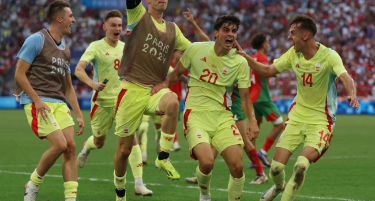In a dramatic turn of events, substitute Juanlu Sánchez emerged as the hero for Spain, scoring a late winner to secure a 2-1 victory over Morocco in the semi-final of the Olympic men’s football tournament on Monday. The match, held at the iconic Stade Velodrome in Marseille, was a tense and thrilling affair, with both teams vying for a spot in the prestigious final.
Morocco, who had been one of the standout teams in the tournament, initially took the lead late in the first half. The breakthrough came in the 37th minute when Soufiane Rahimi coolly converted a penalty. The penalty was awarded after a VAR review confirmed that Spain’s Pablo Barrios had committed a foul on Amir Richardson inside the box. Rahimi, who has been in scintillating form throughout the Olympics, stepped up to the spot and calmly sent the Spanish goalkeeper the wrong way. This marked Rahimi’s sixth goal of the tournament, making him the leading scorer in the competition, with four of his goals coming from penalties.
The Moroccan side, buoyed by their passionate supporters, appeared to be in control as they headed into the halftime break with a one-goal advantage. The North African team, who were last year’s Under-23 Africa Cup of Nations champions, had impressed throughout their run to the semi-finals and looked poised to pull off an upset against the European giants.
However, Spain, who were seeking to reach their second consecutive Olympic final, remained composed despite the early setback. As the second half progressed, they began to assert their dominance, controlling possession and probing the Moroccan defense in search of an equalizer. Their persistence paid off in the 66th minute when Barcelona’s Fermin López stepped up to the occasion. López, who had been a standout player for Spain during the tournament, found the back of the net to bring the score level at 1-1. His goal, a result of patient build-up play, ignited the Spanish side’s hopes and shifted the momentum of the match.
With the scoreline even, the match looked set to go into extra time. However, Spain had other ideas. In the dying minutes of the game, Fermin López, who had already made his mark on the match with the equalizer, turned provider. He delivered a precise pass to Sevilla’s right-back, Juanlu Sánchez, who had come on as a substitute. Sánchez seized the moment, firing a low, driven shot past the Moroccan goalkeeper to give Spain a decisive 2-1 lead.
 The late goal sent the Spanish bench into raptures and silenced the Moroccan fans who had been vocal throughout the match. It also ensured that Spain would advance to the final, where they will compete for their second Olympic gold in men’s football. Their first and only Olympic triumph came on home soil in Barcelona in 1992. The Spaniards, who had to settle for a silver medal three years ago in Tokyo after a heartbreaking extra-time defeat to Brazil, are now just one win away from redemption.
The late goal sent the Spanish bench into raptures and silenced the Moroccan fans who had been vocal throughout the match. It also ensured that Spain would advance to the final, where they will compete for their second Olympic gold in men’s football. Their first and only Olympic triumph came on home soil in Barcelona in 1992. The Spaniards, who had to settle for a silver medal three years ago in Tokyo after a heartbreaking extra-time defeat to Brazil, are now just one win away from redemption.
The final will take place in Paris on Friday,
The Spanish team will be full of confidence heading into the final, buoyed by their dramatic comeback victory and determined to go one step further than they did in Tokyo.
For Morocco, the defeat was undoubtedly a bitter pill to swallow, especially after they had come so close to reaching their first Olympic final. Nevertheless, they still have a chance to make history by claiming their first-ever Olympic medal in men’s football. The Moroccan team will compete in the bronze medal match on Thursday in Nantes, where they will face Egypt. Despite the disappointment of the semi-final loss, Morocco’s journey in the tournament has been nothing short of remarkable, and they will be eager to finish on a high note by securing a place on the podium.
As the dust settles on a gripping semi-final encounter, both teams will now turn their attention to their final matches. For Spain, it’s an opportunity to cement their place in Olympic football history. For Morocco, it’s a chance to cap off an impressive campaign with a historic medal. Fans around the world will be eagerly anticipating the final showdown in Paris, where a new chapter in Olympic football will be written.




